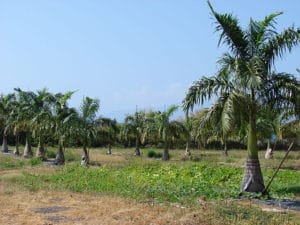Honolulu Civil Beat
By Sophie Cocke

Forest & Kim Starr, Wikimedia
The fight over genetically engineered crops and pesticides is shifting to Maui.
Councilwoman Elle Cochran plans to submit a bill to the Maui County Council on Friday requiring agricultural companies to disclose details about their pesticide use to the county, while farmers would have to report any genetically altered organisms they are growing.
The bill mirrors legislation that recently passed on Kauai over the protests of biotech companies that have vowed to sue the county.
It also comes on the heels of Big Island Mayor Billy Kenoi signing Bill 113 into law on Thursday. It bans biotech companies from growing genetically altered seeds and farmers from harvesting any new GMO crops.
The spate of legislation reflects a growing frustration at the county level toward what some council members say is lax state oversight of pesticides and GMO crops. And it marks a widening offensive by the increasingly organized anti-GMO movement in Hawaii.
Maui County has twice tried and failed in recent years to pass GMO labeling laws and the county already bans GMO taro for Native Hawaiian cultural reasons.
Cochran said that her bill does not specifically target biotech companies. But they will likely be most affected, if the legislation passes in its current form.
The bill requires commercial agricultural companies that use more than 5 pounds or 15 gallons of restricted use pesticides to disclose what chemicals they spray, where and in what quantities. Monsanto, Dow AgroSciences, as well as Hawaiian Commercial & Sugar Co., will likely be affected.
The bill would apply to all of Maui County — including the island of Molokai where both Monsanto and Dow AgroSciences operate and collectively employ nearly 200 people. Monsanto also operates in Kihei on Maui and HC&S has sugarcane fields in central Maui and on the north shore.
Adolph Helm, project manager at Dow AgroSciences on Molokai, said that it was premature to comment on the specifics of the bill.
While the fight over GMOs and pesticides on the Big Island and Kauai have often been heated, Helm said he hoped that discussions in Maui County will remain civil.
“I just hope that it will be a discussion that is done in a way that is respectful and done in a collaborative effort with the county council and the mayor’s cabinet and in a way that we can always look at both sides of the issue,” said Helm.
The debate on Molokai over biotech could grow particularly contentious. The biotech industry supports about one-tenth of the island’s population, but is also home to Walter Ritte, one of the state’s most visible anti-GMO activists.
In a move that might potentially preempt the county legislation, Monsanto forged an agreement with Maui Mayor Alan Arakawa that promises to disclose details about its pesticide use and increase community outreach.
Cochran says that the memorandum of understanding between the mayor and Monsanto doesn’t go far enough. “Not even close,” she said.

